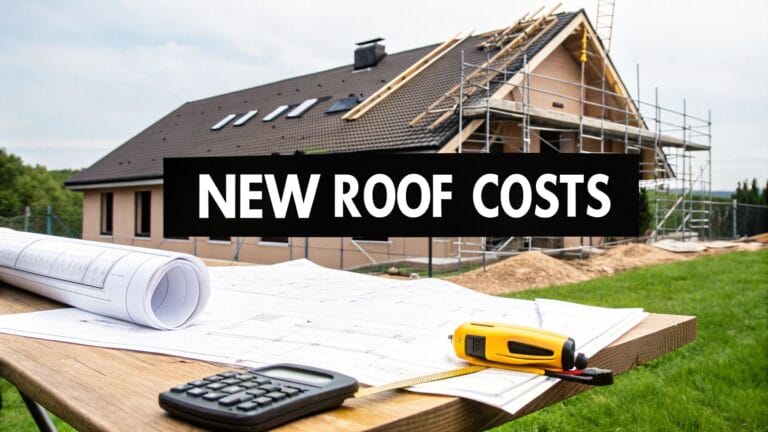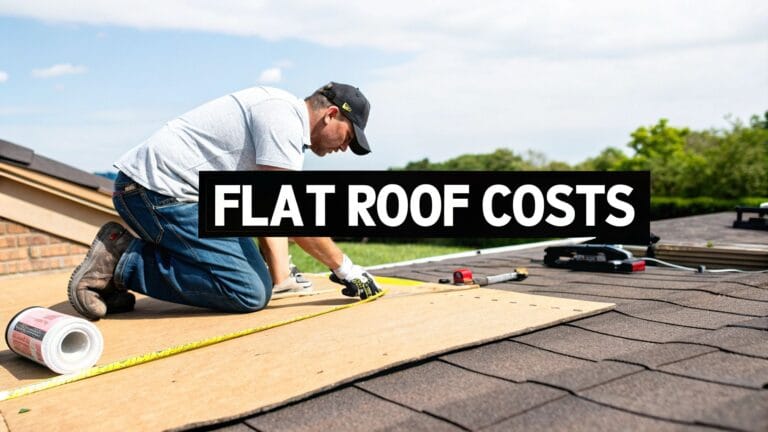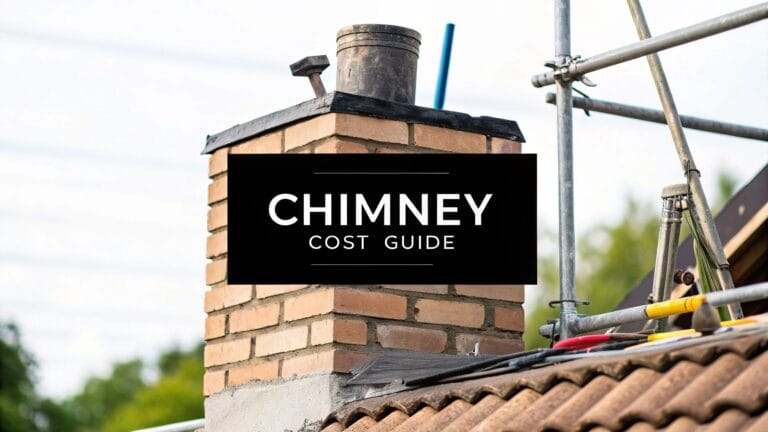
Finding Roofing Specialists Near Me in the UK
Searching for 'roofing specialists near me'? Our guide shows UK homeowners how to vet, compare quotes, and hire the right local roofer for your project.
That sinking feeling when you spot a damp patch spreading across the ceiling is a universal sign of trouble. Your first instinct might be to frantically search for "roofing specialists near me," but hold that thought. At Evershield Roofing, we know that taking a moment to define your project first will save you a world of time, money, and stress down the line. It's the key to connecting with the right specialists from the very beginning.
First, Define Your Project Before You Search
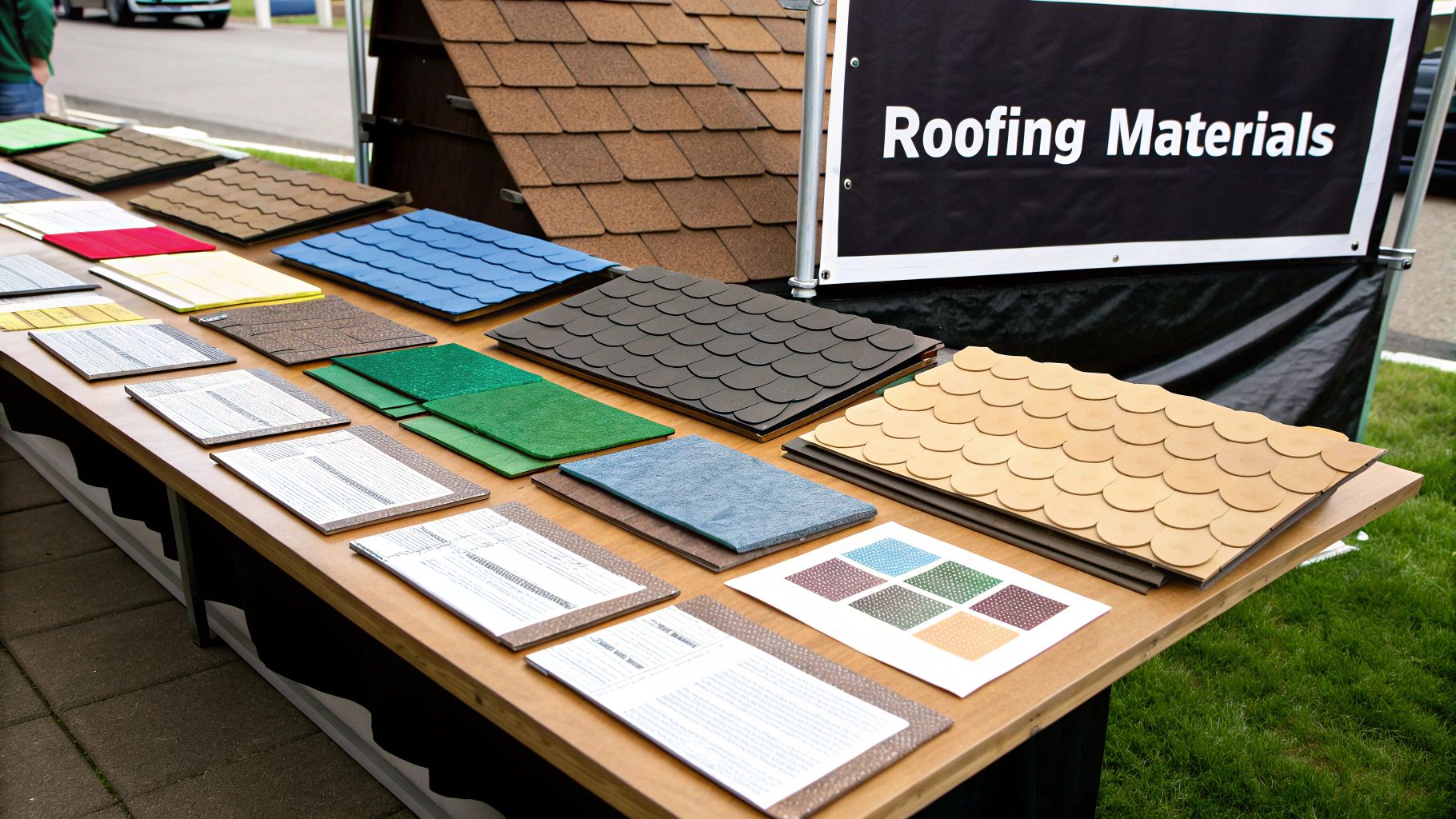
Before you even think about picking up the phone, the most powerful thing you can do is become your own project investigator. When you understand the problem, your first call transforms from a vague cry for help into a productive, professional conversation. You’ll immediately come across as a homeowner who’s done their homework, which sets a much better tone with any reputable contractor.
This clarity is more important than you might realise. The UK roofing industry is a significant part of our economy, with a market size expected to hit £7.2 billion in 2025. This growth means there's a huge demand for qualified specialists, making it crucial to approach your search with a clear plan to find the best of the bunch. You can learn more about these UK roofing market trends on ibisworld.com.
To get started, it's helpful to answer a few key questions. This simple exercise will give you the clarity needed to have a meaningful conversation with potential contractors.
Initial Project Assessment Checklist
Use this checklist to define your roofing needs before you contact specialists.
| Assessment Question | Your Notes / Answer | Why It Matters |
|---|---|---|
| What is the primary problem? | e.g., Water stain on the bedroom ceiling, missing slates after a storm. | Helps contractors understand the immediate issue. |
| How old is your roof? | Estimate if you're not sure (e.g., 20+ years). | Age is a key indicator of whether a repair or a full replacement is more likely. |
| What type of roof do you have? | e.g., Slate, tile, flat felt, fibreglass. | Different materials require different expertise and repair techniques. |
| Is this a new or recurring issue? | e.g., "It's the first time," or "This leak was 'fixed' last year." | A recurring problem points to a deeper issue that needs a more thorough investigation. |
| What is the scale of the job? | e.g., "Just one small leak," or "Leaks in multiple rooms." | This helps determine if you need a repair specialist or someone equipped for a full re-roof. |
Having these answers ready arms you with the information you need to find the right person for the job, rather than just the first person who answers the phone.
Assess the Damage (From a Safe Distance)
Now, let's get a bit more specific. You need to document what you can see, but please don't get a ladder and climb onto the roof yourself. Safety first, always. Instead, grab a pair of binoculars and inspect from the ground, or take some high-resolution photos from an upstairs window.
Here's what you should be looking for:
- Slipped or Missing Tiles: Are there obvious gaps where slates or tiles should be? Try to note the location and roughly how many. For example: "I can see three missing tiles on the back of the house, above the kitchen window."
- Cracked or Damaged Tiles: Can you spot any tiles that are visibly broken or have chunks missing? This is a common sight after high winds.
- Debris in Your Gutters: An accumulation of gritty granules from felt shingles is a classic sign that the material is getting old and brittle.
- Visible Moss or Algae Growth: While not always a direct cause of leaks, heavy moss can trap moisture against the roof's surface, accelerating wear and tear over time.
A detailed list and a few clear photos are incredibly valuable. When you contact a roofer for a survey, this initial information gives our team at Evershield Roofing a much better idea of the situation before we even arrive, leading to a far more efficient and accurate assessment.
Determine the Scope of Your Needs
Finally, think about the bigger picture. Is this a minor, isolated fault, or is it a symptom of a much larger problem?
A single damp patch in one room, for instance, might point to a straightforward repair, like replacing the flashing around a chimney. But if you're dealing with multiple leaks in different areas of the house, or if your roof is over 20 years old, you could be looking at a more significant project, like a partial or full re-roof.
Thinking about this helps you frame the problem correctly. There's a huge difference between saying "my roof is leaking" and "I've got a leak in the back bedroom, and I can see three slipped slates directly above that window." The second description immediately helps a specialist understand the potential scope and urgency, ensuring your search for local roofing specialists is far more effective from the start.
How to Vet and Shortlist Local Roofers
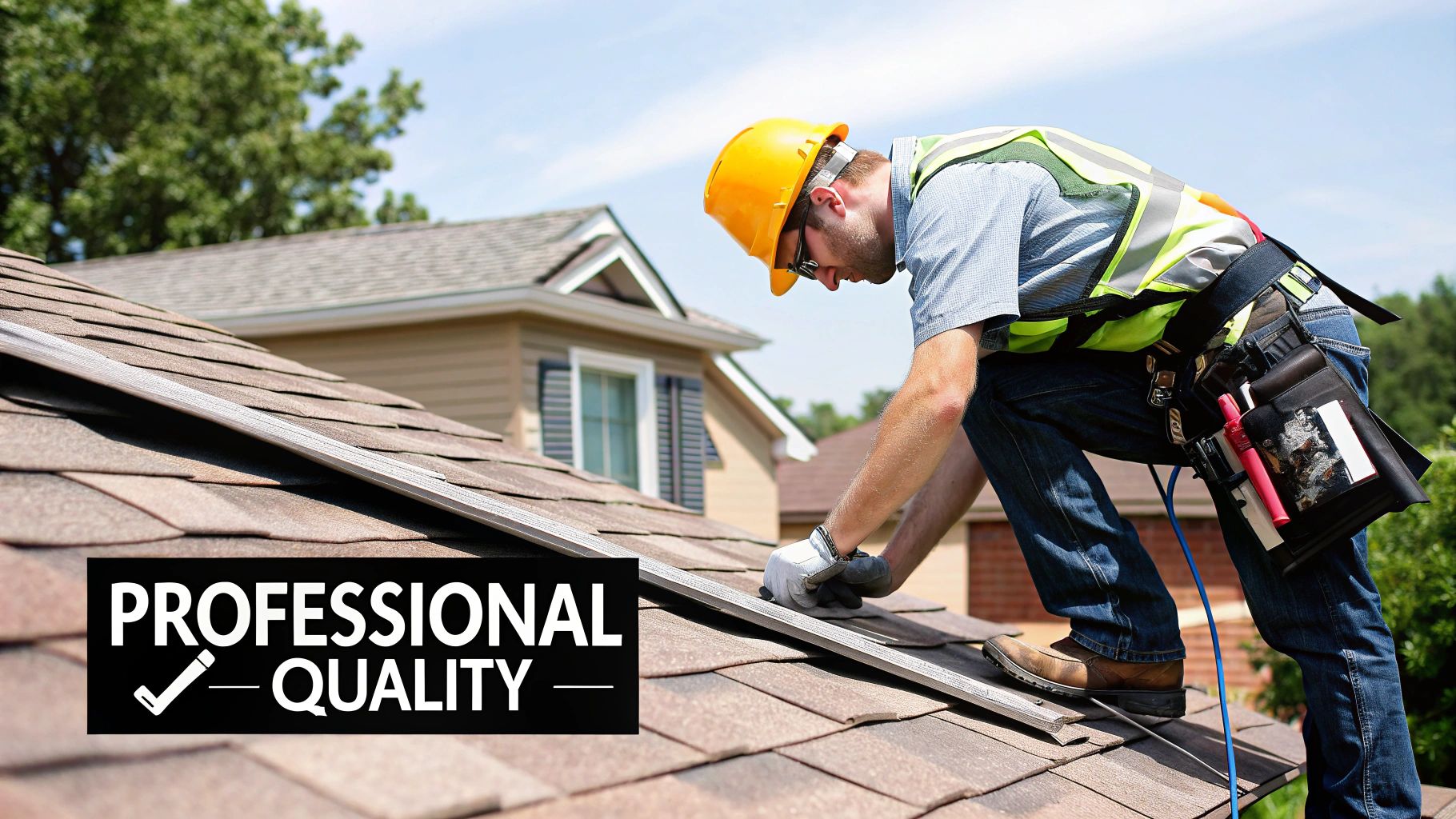
So, you've done your initial search for "roofing specialists near me" and have a few names. Now for the crucial part: digging deeper to separate the true professionals from the rest. This is where you move past the online stars and start asking the tough questions that protect your home and your wallet.
The very first thing to check, before you even discuss the job, is insurance. Don't even think about hiring a roofer who can't immediately show you proof of their cover. Here in the UK, you need to confirm they have two specific types of insurance to ensure you're fully protected.
Essential Insurance You Must Verify
Hiring an uninsured roofer is a massive gamble. If a tile slips and smashes your neighbour’s car, or worse, a worker gets injured on your property, you could be the one facing the bill. It's a risk you just can't afford. Any reputable firm like ours will have their documents ready without you even having to push.
Here’s what you need to see:
- Public Liability Insurance: This covers claims if your property or a third party's is damaged during the work. Think of a tile falling on your car or a neighbour's conservatory. We recommend a minimum cover of £2 million, but frankly, £5 million is much better and shows they take their responsibilities seriously.
- Employers' Liability Insurance: This isn't optional—it's a legal requirement for any company with employees. It protects their team if they have an accident while working on your roof. Without this, you could get dragged into a messy and expensive legal situation.
Don't just take their word for it. Ask for a copy of their insurance certificate and check that the policy is up-to-date. If they hesitate or make excuses, walk away. It’s an immediate red flag.
Check for Trade Body Accreditations
Another strong sign of a roofer’s quality is their membership in a respected UK trade body. These organisations don't just hand out memberships; they vet their roofers for quality workmanship, sound business practices, and safety standards. It’s a good sign they are committed to their craft.
Keep an eye out for logos from groups like:
- The NFRC (National Federation of Roofing Contractors): This is the UK's largest and most respected roofing trade association.
- The CORC (Confederation of Roofing Contractors): Another key organisation known for its strict code of practice and the insurance-backed guarantees its members can offer.
You can easily verify a roofer’s membership by visiting the trade body’s website. They all have a member search function. It’s a quick check that adds a powerful layer of reassurance.
Key Questions for Your Initial Call
That first phone call is your chance to get a feel for their expertise and customer service. Don't just ask for a quote. Use it as a mini-interview to see if they know their stuff.
If you're dealing with a specific issue like a persistent leak, having a bit of knowledge yourself can help you ask smarter questions. Our troubleshooting guide to common roofing problems can give you some useful background.
Try asking specific, practical questions like these:
- "I have a slate roof on my Victorian terrace in Aylesbury. Can you tell me about a similar repair job you’ve done recently?"
- "How do you plan to protect my garden and driveway while the work is being done?"
- "If we go ahead, who will be my day-to-day contact person for the project?"
The way they answer will tell you volumes about their real-world experience, their processes, and how much they value their customers. These answers are what will help you narrow down your list to the very best local specialists.
Decoding and Comparing Roofing Quotes
Getting a few quotes from local roofing specialists is the easy bit. The real work starts when you have to sit down and figure out which one actually offers the best value for your money. It's about more than just finding the cheapest price; it's about understanding what you’re truly paying for to avoid nasty surprises down the line.
Think of a quote not as a price tag, but as a blueprint for your entire project. A professional, trustworthy roofer will provide a detailed, itemised breakdown that leaves nothing to chance. From the specific brand of tiles to the cost of hiring a skip, everything should be crystal clear. This transparency is the first sign you're dealing with a true professional.
What to Look for in a Professional Quote
When we at Evershield Roofing put a quote together, we make sure it’s completely transparent. We want you to feel confident, and that comes from being fully informed. Any reputable UK roofer should provide a quote that clearly itemises the following:
- Materials: It shouldn't just say 'tiles'. It should specify the exact brand and type, like 'Redland 49 Concrete Tiles in Terracotta' or a 'Cure It GRP Fibreglass System'. This level of detail matters.
- Labour Costs: This should outline the cost for the skilled team working on your roof, often broken down by the estimated number of days or hours required.
- Scaffolding: If your job needs it, the cost to put up and take down the scaffolding should be a separate line item.
- Waste Disposal: The quote needs to account for hiring a skip and responsibly getting rid of all the old roofing materials.
- Contingencies: A truly professional quote will often mention how unforeseen problems are handled. For example, what's the plan if they remove the old felt and discover rotten timber underneath?
Learning to Spot the Red Flags
The biggest warning sign? A serious lack of detail. If you get a quote that just says, "Fix roof leak – £750," you should be concerned. What does that actually include? What materials are they using? Is the work guaranteed? Vague, one-line quotes are a recipe for disputes later on.
This is where you can see the real-world difference between a quick fix and a professional job.
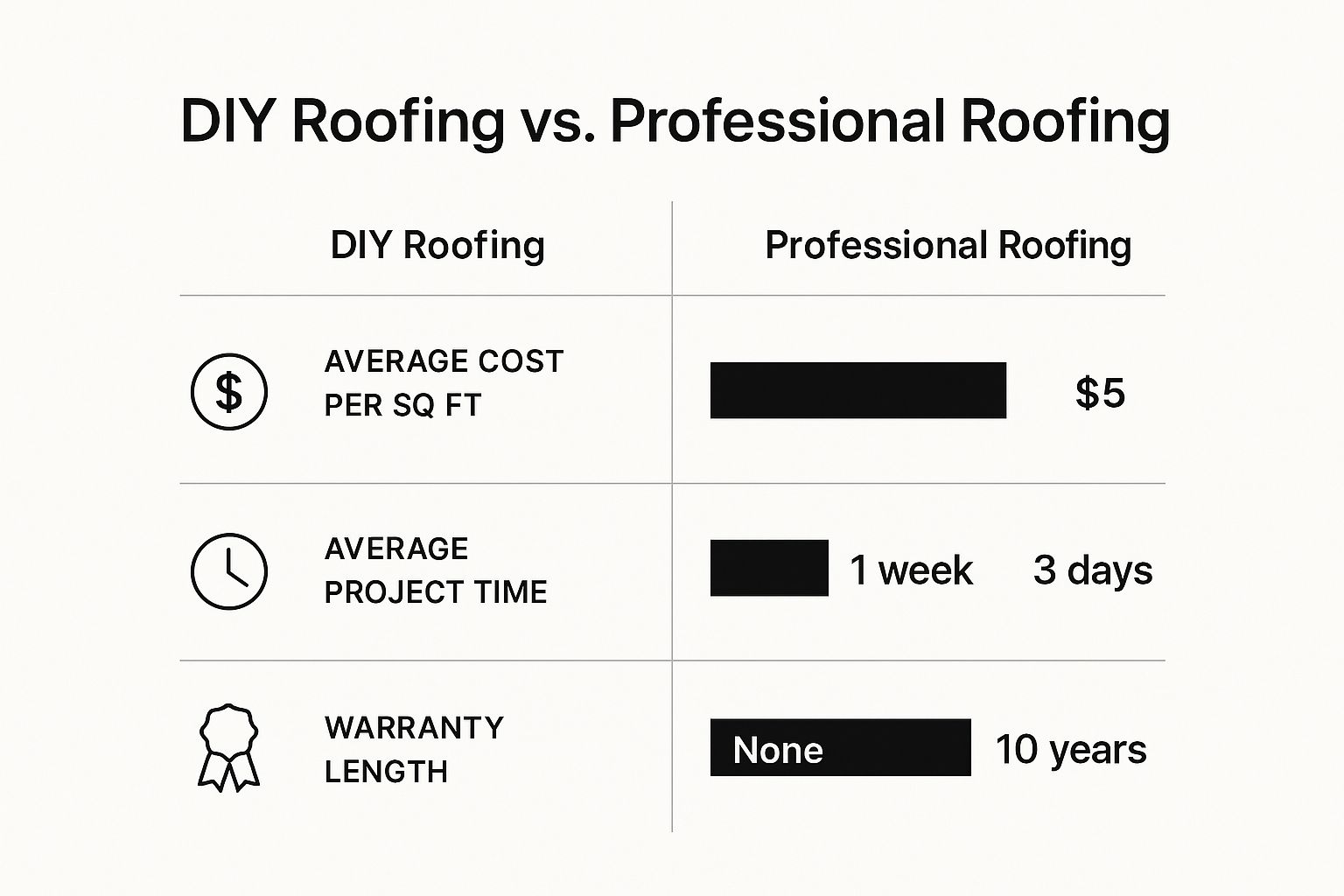
As the numbers show, trying to save a few pounds with a DIY approach or a suspiciously cheap quote often backfires. The lack of a proper warranty and the potential for a job to drag on can end up costing you far more in the long run.
It’s also worth remembering that the cost of building materials can change. Recent UK government data tracks the price fluctuations of materials like slate and concrete tiles, which directly impacts how roofing specialists price a job. If you're interested, you can explore the building materials statistics on GOV.UK to get a feel for these market trends.
To help you sift through the paperwork, here’s a quick guide to common red flags you might find in a quote and what they could mean.
Quote Comparison Red Flags
| Red Flag | What It Could Mean | Your Action |
|---|---|---|
| Vague, One-Line Descriptions | The contractor may be hiding costs or planning to use subpar materials. Lack of professionalism. | Ask for a fully itemised breakdown. If they refuse, walk away. |
| No Mention of a Warranty | They may not stand by their work, leaving you unprotected if something goes wrong. | Query this immediately. A professional always offers a warranty. |
| Pressure for a Quick Decision | A "today only" price is a high-pressure sales tactic, not a sign of a good deal. | Take your time. A reputable roofer will respect your need to decide. |
| A Price That's "Too Good to Be True" | The quote might be missing key costs (like waste disposal) or they might be using cheap, unreliable materials. | Compare it closely with other detailed quotes. Ask what’s been excluded. |
| Request for a Large Upfront Deposit | While a small deposit is normal, a large one can be a sign of a company with cash flow issues or a potential scam. | Check their credentials and reviews. Never pay the full amount upfront. |
Ultimately, a quote tells you a lot about the company itself. A detailed, transparent document shows they are organised, thorough, and professional. A vague estimate suggests they might be willing to cut corners—not just on their paperwork, but on your roof as well.
Our advice? Always go with the specialist who provides a comprehensive breakdown. It shows they’re committed to quality and clear communication from the very beginning, which is exactly what you want when you’re investing in your home.
Choosing the Right Materials for the UK Climate
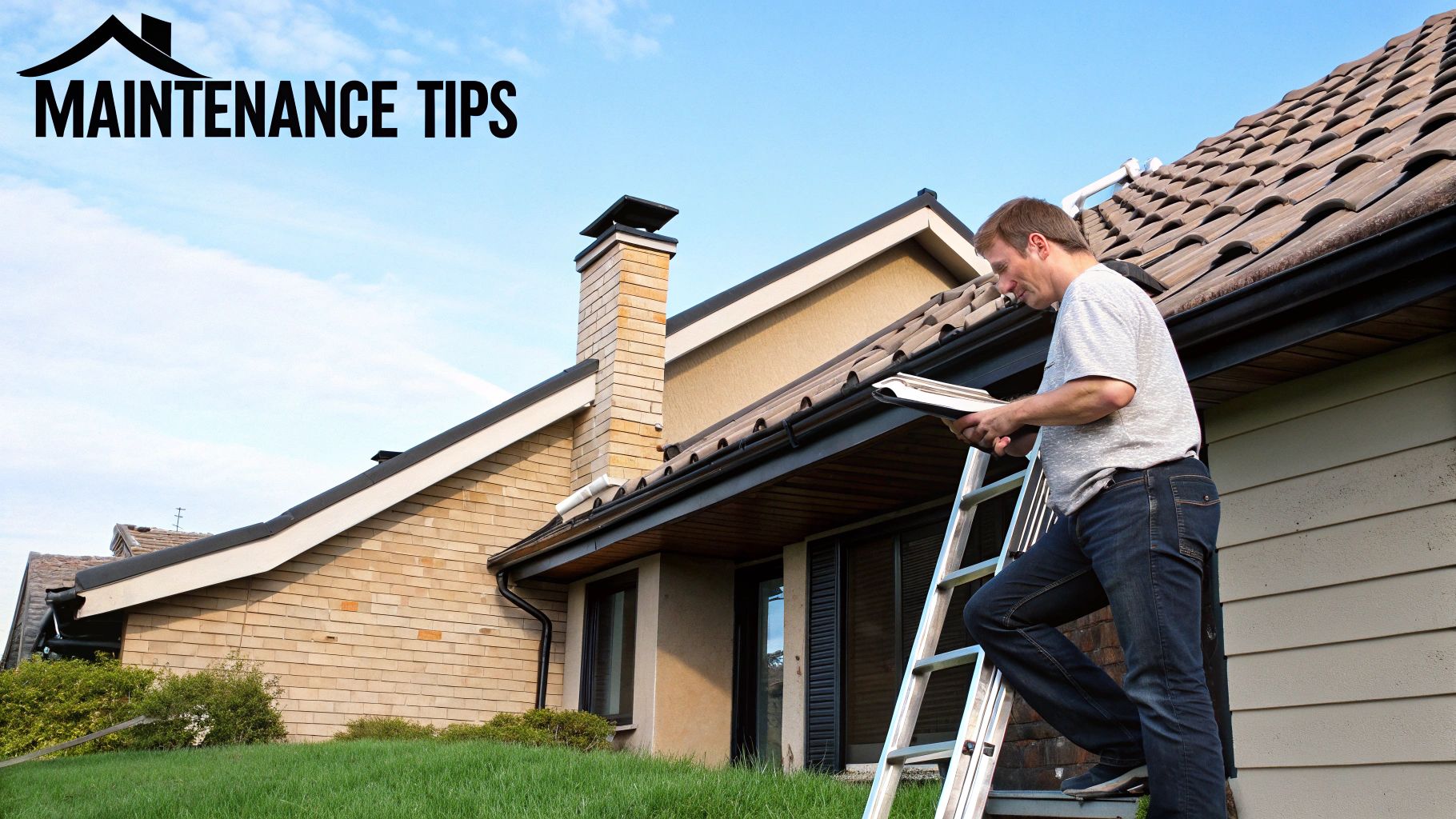
The skill of the roofer fitting your new roof is paramount, of course. But the materials they use? That’s what will truly determine how well it performs and how long it lasts, especially with our notoriously damp and unpredictable UK weather.
Making the right choice here is a conversation you absolutely must have with any roofing specialist you’re thinking of hiring. It's a decision that can save you from a world of future problems and can even add real value to your property.
Think about it: a homeowner with a period property in Buckinghamshire will have very different needs and aesthetic concerns compared to someone with a modern home needing a flat roof repair. Knowing the main options helps you ask the right questions and understand what's genuinely best for your home and budget.
The UK roofing market is always moving forward, with new builds and the push for better performance driving change. We're seeing more eco-friendly materials and smart solutions like integrated solar panels, partly in response to new energy conservation rules. For homeowners, this means more choice than ever before. You can discover more about these UK roofing market trends on openpr.com.
Traditional Materials for Classic Properties
For many UK homes, especially older ones, sticking with traditional materials is non-negotiable. It's often essential for preserving the building's character and sometimes a requirement for planning permission. These materials have been trusted for centuries for a reason.
- Natural Slate: Welsh slate is famous across the globe for its incredible durability, often lasting well over 100 years. It provides a premium, timeless look but does come with a higher price tag. It’s the gold standard for many historic and high-end properties.
- Clay Tiles: Coming in a wide range of shapes and earthy colours, clay tiles are perfect for that classic, rustic aesthetic. They are exceptionally durable and stand up brilliantly to the British weather, which is why you see them everywhere.
When you're looking at these classic options, it’s not just about aesthetics. They are heavy materials, so your roofer must first confirm your property's structure can handle the load. This is a standard part of our initial free survey.
Modern Innovations for Performance and Efficiency
While traditional materials are fantastic, modern innovations offer incredible performance, especially for extensions, new builds, and the ever-tricky flat roof. At Evershield Roofing, our teams install these advanced systems all the time.
A great example is GRP fibreglass, which we often recommend as a seamless and highly durable solution for flat roofs. Old-school felt systems were notorious for cracking and leaking. In contrast, a professionally installed GRP roof creates a single, unbroken waterproof barrier that can easily last for over 25 years with very little upkeep.
Another game-changer we use is the advanced breathable membrane. This is an underlay fitted beneath your tiles or slates. It cleverly allows moisture from inside your home to escape while stopping rain from getting in. This simple layer dramatically cuts the risk of condensation and timber rot in your loft, making your home healthier and more energy-efficient.
By discussing these modern options with your local roofing specialists, you can make sure your home is protected with the best technology on the market.
Finalising Your Contract and Preparing for Work
You’ve done the legwork. You’ve sifted through quotes, checked references, and found a local roofing specialist you trust. That’s a huge step forward! But before you can relax, there's one final, crucial piece of the puzzle: the contract.
A handshake and a verbal promise might feel friendly, but they offer zero protection when it comes to a major investment like a new roof. A detailed, written contract is the only thing that stands between a smooth, professional job and a project plagued by misunderstandings and surprise costs. It’s your project’s instruction manual, and at Evershield Roofing, we believe it's non-negotiable.
What Must Be in Your Roofing Contract
Think of your contract as the complete blueprint for the job. If something isn't written down, you have to assume it's not part of the deal. So, before you put pen to paper, carefully check that it covers these absolute essentials:
- Full Scope of Work: This needs to be an itemised breakdown of every single task. We're talking about everything from stripping the old roof and disposing of the debris to specifics on the underlayment, ventilation, and flashing that will be installed.
- Specific Materials: Vague descriptions won't cut it. The contract should name the exact brand, type, and colour of all materials. For example, it should say ‘Forticrete Centurion Low Pitch Roof Tiles in Slate Grey,’ not just ‘grey tiles.’
- Start and Completion Dates: A professional will provide a clear timeline, outlining an estimated start date and a target for completion, always with a mention that it's weather permitting.
- Detailed Payment Schedule: This should break down payments and link them to key project milestones. A common structure is a deposit upon signing, another payment when materials arrive on-site, and the final balance only after the work is finished and you’ve signed off on it. Never, ever pay for the entire job upfront.
- Warranty Information: The document must clearly outline two separate things: the manufacturer’s warranty on the materials and, just as importantly, the roofer's own guarantee on their workmanship.
Your contract is your ultimate safeguard. Taking the time to read and understand it ensures that what you discussed is exactly what will be delivered. If anything is unclear or missing, ask for a revision before signing.
Preparing Your Property for the Work
With the contract signed, a little bit of prep work on your end can make a massive difference to how smoothly the project unfolds. We always give our clients a simple checklist before our team arrives – it just helps everything run like clockwork.
These small gestures are always appreciated and help protect your home. While you have experts on the job, you can find more helpful advice in our guide on key questions to ask when choosing the right contractor for your new roof.
Here are a few things to consider:
- Clear the Area: Move any cars out of the driveway and shift garden furniture, barbecues, or plant pots away from the walls of the house.
- Confirm Site Access: Have a quick chat about where the team can park their van, where the skip will be positioned, and if they’ll need to plug into an outdoor power socket.
- Protect Your Garden: Ask the contractor how they plan to shield your lawn and flowerbeds from falling debris. Pros will use heavy-duty tarps and boards as a matter of course.
- Inform Your Neighbours: A quick heads-up for your neighbours is a simple courtesy that goes a long way. Letting them know about the upcoming work and potential noise helps keep everyone on good terms.
Common Questions When Hiring a Roofer
Choosing a roofer can feel a bit overwhelming, and it’s natural to have a lot of questions. In my experience, homeowners want to feel confident and clear about the process before any work starts. To help with that, I’ve put together some straightforward answers to the questions we hear most often from property owners across the UK.
Getting these details ironed out from the start is the best way to make sure the project runs smoothly for everyone involved.
How Much Should a Roof Repair Cost in the UK?
This is usually the first thing people ask, but there’s no single answer. The final cost really depends on the scale of the problem, the specific materials needed, and even where you are in the UK.
For a small job, like replacing a few tiles that have been knocked loose in a storm, you’re probably looking at somewhere between £150 and £350.
However, for more complex repairs, like fixing a leak in a roof valley or sorting out the lead flashing around a chimney, the cost can climb to between £500 and £1,500 or more. If you're looking at a full re-roof, that's a much bigger investment, often starting around £5,000 and going up depending on the size of your roof and the materials you choose. The only way to know for sure is to get at least three detailed, written quotes to get a real sense of the fair market price for your specific job.
Do I Need to Pay a Deposit Upfront?
Yes, it’s standard practice for a roofing company to ask for a deposit. This is typically to cover the initial cost of ordering materials for your job and is usually around 10-25% of the total project value.
A huge red flag should be any roofer demanding a massive deposit, like 50% or more, before a single tile has been delivered to your property. A professional, established business will have trade accounts with suppliers and doesn’t need a huge cash payment from you just to get started. All payments should be clearly linked to project milestones.
What Kind of Warranty Should I Expect?
This is a critical point. You should always expect two separate warranties, and it's essential you get clear documentation for both.
- Manufacturer’s Warranty: This guarantee comes from the company that made the materials—the tiles, slates, or flat roofing system. These can last anywhere from 10 to 50 years, depending on the quality of the product.
- Workmanship Guarantee: This is your roofer’s personal promise that their installation work is of a high standard and will last. For a complete new roof, a trustworthy specialist should offer a workmanship guarantee of at least 10 years. For smaller repairs, this might be shorter, perhaps 1-5 years.
Knowing these details gives you the power to choose the right roofer with confidence. And once your roof is sorted, you'll want to keep it that way. You can find out more with our essential roofing maintenance tips to help protect your investment for years to come.
Your roof is one of the most important defences your property has. Making sure it’s in the hands of experienced, fully insured professionals is non-negotiable. For a free, no-obligation survey and a clear, honest quote for any roofing work in Buckinghamshire and the surrounding areas, get in touch with Evershield Roofing today. Our team is here to give you the peace of mind that comes from knowing the job's been done right.

